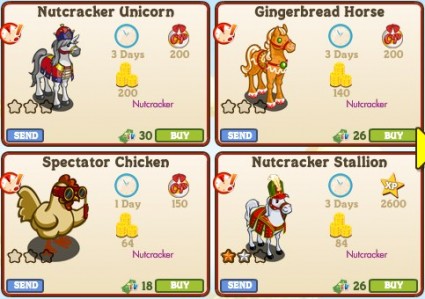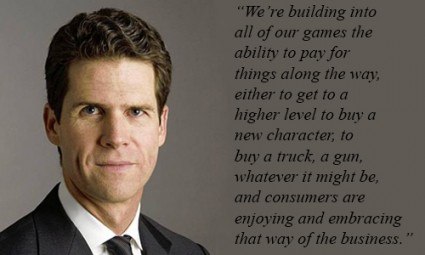Editorials
Tread softly EA, because you tread on my dreams
March 12, 2013, Author: Trent Pyro
EA recently announced that all their future titles would include some form of micro-transaction inclusion. The act of paying a small fee for in-game content is not exactly new but with growing controversy over ‘pay-to-win’ options ruining many a PC-based MMO, using the system as a standard revenue stream is a bold move; one that won’t go over well with everyone.
How bad is it though? The system has seen success in Free-to-Play (F2P) MMORPGs such as Rift and DC Universe Online and people generally seem to be happy with having the option. However, EA are going to have to be very careful in how they go about implementing this new direction and here’s why…
Little bit on the side
The micro-transaction began as a way for players to spend small amounts of cash for extra in-game items and has quickly evolved into the primary revenue stream for many games. Essentially a way of continuing to make money from a released game, many developers have taken to using it as a way of generating cash-flow from initially free games.
The sword has, of course, been double-edged and has been used for both good and evil. While I’m not going to go into it in great detail, there are a couple of perfect examples.
DC Universe Online is an MMORPG where you can make your own superhero and quest in famous DC locations, fight legendary DC villains and work alongside heroes like Superman and Wonder Woman. Originally a subscription-based service rolled out on PC and PS3, it went free-to-play in 2011 and has had continued success ever since. Players can now partake in the entire vanilla game free of charge, with DLC packs and a number of cosmetic items available to purchase if they want to. As a regular player I can honestly say I’ve never felt pushed or forced into spending real money on the game, although I have bought a few things. As a neat little reward for those who feel like buying some stuff, if you spend over $5 on in-game items you receive a complementary Premium membership, unlocking more character slots and more bank slots to store items.
The game also still offers a paid Legendary membership, complete with a hefty list of advantages, including free access to all the DLC and a monthly stipend of Seven Cash, the currency used to buy real-money items. This system has allowed Sony (and now new owner ProSiebenSat1) to maintain both a regular, subscription-paying user base and a huge community of F2P users who not only bolster server numbers but also contribute a large amount of micro-transaction based cash each year.

With 20 Farm Cash costing just over £3, you can can see how pricey these single-use items are…
At the other end of the scale is well-known Facebook craze Farmville. Starting initially as a free game to play with your friends, it quickly became known for its appalling array of real-money items. Many of the highest-yeilding crops, most useful tools and most diverse cosmetic items cost ridiculous amounts of ‘Farm Cash’ and people quickly became irritated by this and developer Zynga basically established that those with the spare cash to spend would be able to get a bigger, better farm much quicker than their friends. While there was never any attempt to force payment from players, it became rapidly obvious that in order to progress at anything greater than a casual, snails pace, real money would have to be spent.
Money for new rope
So why do we even buy this crap in the first place? That’s a question many a non-gamer has asked over the years and to a person who only consumes material goods it’s a legitimate one. Not everyone sees the benefit in paying for digital content and that’s not surprising. I remember the first time I came across micro-transactions (in Habbo Hotel if you can believe it) and was baffled at how people were spending real money on sofas, TVs and fish tanks for their little Habbo’s rooms. Mere weeks later I was spending a chunk of my monthly phone credit on the same stuff.
To my mind there are two kinds of content that are offered through micro-transactions; cosmetic and affecting. Cosmetic content is purely for looks; a silly hat, a blue glow for your character. Affecting content actually changes the game in some way, for example a powerful weapon or a fast car.
Some games offer both, although offering affecting content has generally always been seen as a bit insidious and so is often avoided by the more fair-minded publishers and developers. Why? If someone wants to pay extra money for a beastly sword then they should be able to right? Well it’s not a matter of how it affects those who pay but instead how it affects those who don’t.
Why we play
Since the dawn of gaming, one thing has been certain; to get to the last level you have to beat the levels previous. Of course cheats have usually been available but using them to progress has always been seen as just that; cheating. So someone who beats the last boss by using the Level Skip and Invincibility cheats can’t claim the same prestige as someone who beats it by fighting through how ever many levels of hell and being really fucking good.
The problem with affecting content is that it is essentially legitimised cheating. It bypasses the enjoyment and fulfilment of actually playing the game and allows those who have the cash to essentially buy their way to the end, hence the term pay-to-win. While most games don’t offer a simple ‘Pay 100 moneys to win the game!’ option, some actually have.

You won’t have to do too much of this, all thanks to the Time Is Money Pack!
Take Skate 2’s ‘Time is Money’ pack, curiously also presided over by EA. It enabled players to bypass the hours of time it would take to unlock all the spots, challenges and parks by paying a small fee. While it was a great option for those who had little time to play and wanted to experience the content they paid for by buying the game, the fact that it came in the first cheat-free age of gaming since the arcade meant it took away the prestige of doing it the hard way.
Players with the money to burn could pay their way to the end and without looking in their DLC list you’d be none the wiser to their actions. A friend of mine actually unlocked everything by playing and felt a genuine sting of anger when his brother-in-law just paid the money and got it all with no effort.
This kind of wealth-based advancement is an essential pillar of capitalism and it occurs in everyday life. Status has become a matter of what you have, not how you got it. The man who owns the Ferrari Enzo gains reknown for simply owning the car, how he actually afforded it now a secondary concern. Fact is, he has a Ferrari and you don’t. No matter that he bought it with money he inherited from a rich relative and did not a single day of work to acquire it. No matter that you worked hard for a year to afford your modest Nissan; it’s not a Ferarri is it?
The less material-orientated among us still subscribe to the old adage of working for what you have and believe that what you did to get the item is still more important than the item itself, but unfortunately that way of thinking is rapidly dying.
The reason I digress into a wordy explanation of material wealth is because games have always been the one place where how much your have or how awesome you are in the real world has little-to-no bearing on your abilities in the game world. You could be a weak, short, ugly person in real-life and you can still be a tall, handsome, ripped warrior in the game. Games give us the ability to roleplay how we want to be and allow us an escape from the often fucking awful state of reality. Not everyone can be a galaxy-saving war hero or a damsel-rescuing knight in real life but, thanks to games, we can all be just that.
Gaming has enabled a genuine overcoming of race, creed, class and wealth. As long as you can scrape enough pennies together to buy a console and a game, you can be the best in the world. When you’re caning through a round of Free for All in CoD or fighting toe-to-toe in Street Fighter IV, the only thing that matters is your skill. The only thing that is valid is your ability. The person you’re against could be richer, more successful and more beautiful than you, but in that moment, in that world, it doesn’t matter one single solitary shit. You beat them through sheer hard work, skill and practise.
The ability to pay-to-win crushes this socially-freeing quality and allows those with the most money to win the easiest, bringing game worlds crushingly in line with reality. In almost every other sector of life, the rich can simply pay to achieve. A rich man doesn’t have to build a grand house, he simply buys it. A rich man doesn’t have to learn to carve an ornate chair, he can simply pay someone else to do it and give them a little extra to allow him to say that he did. While games were one of the few, sacred places where you had to earn everything you achieved, companies like EA now seem to be trying to drag them kicking a screaming into the harsh, brutal and most importantly unfair real world.
The Flipside
EA are not the only company doing this and they are simply my current, primary target because their Executive VP Blake Jorgensen has been so blatant about allowing micro-transactions to permeate every one of EA’s future titles, even going so far as to categorically state that players will be able to pay to “get to a higher level”. He also claims consumers are “enjoying and embracing that way of the business” and so I felt compelled to let Mr Jorgensen know that not everyone is doing so. Many of us feel that allowing rich players to pay for high-level content will devalue our own efforts and bring games in line with the money-oriented nature of our modern capitalist reality.

Ha, good luck with that…
However, don’t take this as my declaration against the principle of micro-transactions. As I said, many smaller companies and companies offering F2P games use the system as a means of securing a revenue stream that keeps on giving and many of them allow their games to be enjoyed transaction-free. Whether this moral way of using micro-transactions will survive the current ‘triple dip’ world recession and the relatively bleak economic future ahead of us remains to be seen. It’s clear, though, that not all companies are dedicated to fleecing us out of our achievements.
So all power to the small developer who offers a free game with available cosmetic items. They need to make money somehow; the rent, bills, costs and fees won’t pay themselves. All power to the big boys who want to offer us additional content, exclusive items, new costumes and new skins to supplement our retail game purchases. DLC is a fantastic way of not only offering affordable, rapid, additional gameplay but also a way of continuing to earn money from a product and keeping a game playable and popular.
It’s just that EA and others thinking of following their example should tread with caution. Their assumptions that everyone is happy with pay-to-win are almost certainly false and unless they take this into consideration and ensure that the empowering nature of the games we love isn’t tarnished, they could have a very nasty backlash on their hands. At the end of the day, we need to buy into it in order for it to be successful and in that respect, we still hold the power. I feel Yeats, almost prophetically, summarised my feelings over a hundred years ago:
But I, being poor, have only my dreams;
I have spread my dreams under your feet;
Tread softly because you tread on my dreams.
NOTE: In the time it took me to put this article together, Mr Jorgensen clarified his comments claiming he meant to say that all EA’s mobile games would have micro-transactions in them, not all their games. Whether this is true or a clarifying statement to placate a negative community reaction is up to you to decide…
Tagged Blake Jorgensen, DC Universe Online, DLC, dreams, EA, Electronic Arts, empowerment, F2P, Farm Cash, Farmville, Free to Play, Microtransactions, pay-to-win, real money, Seven Cash, Yeats


